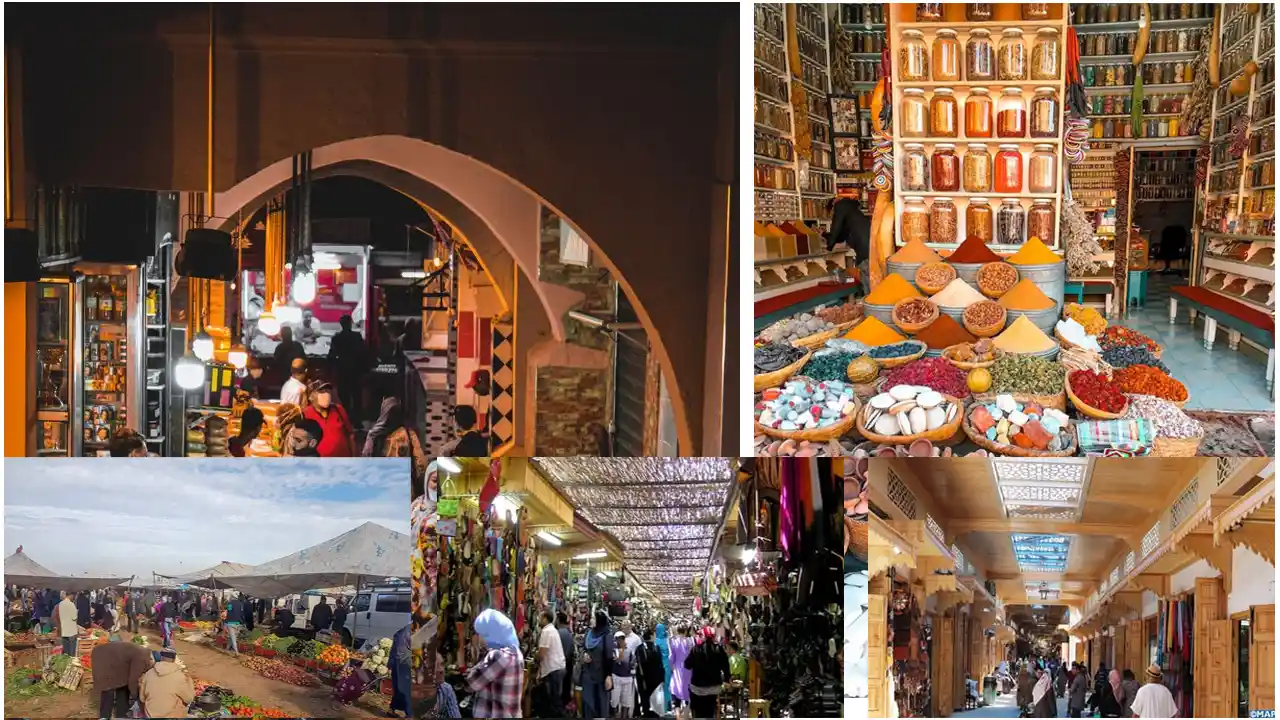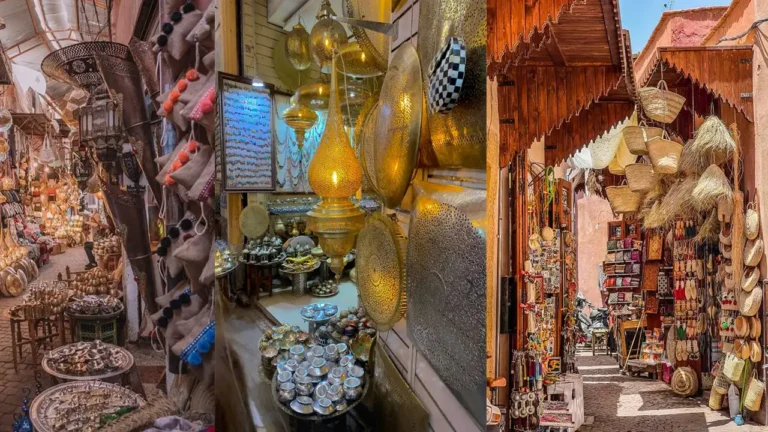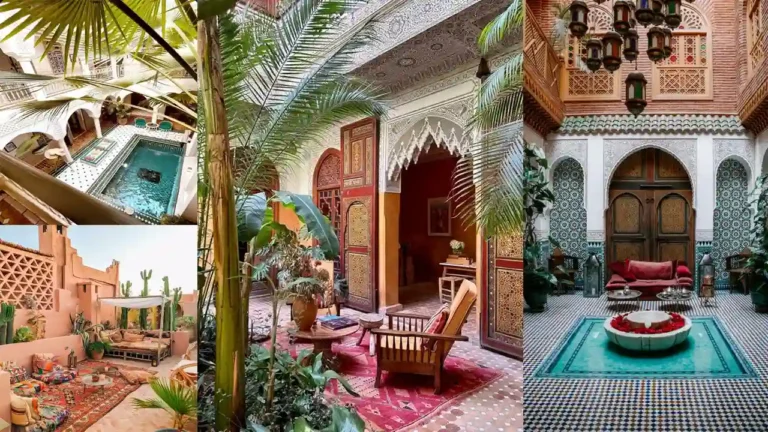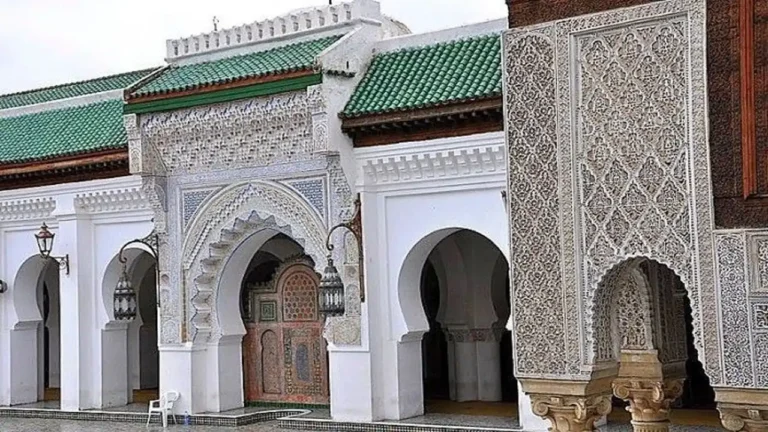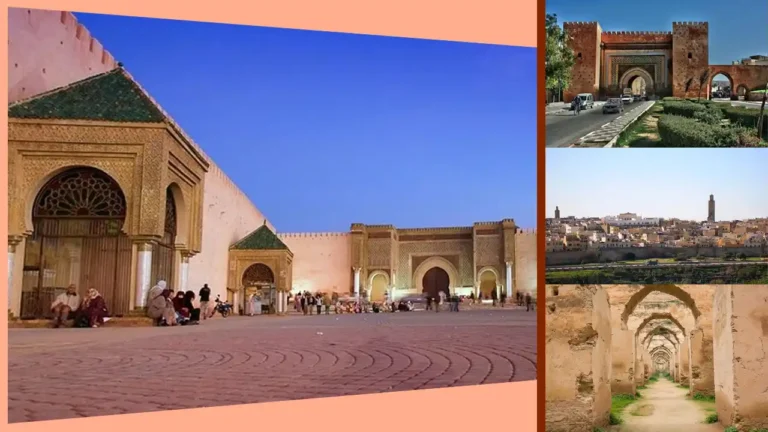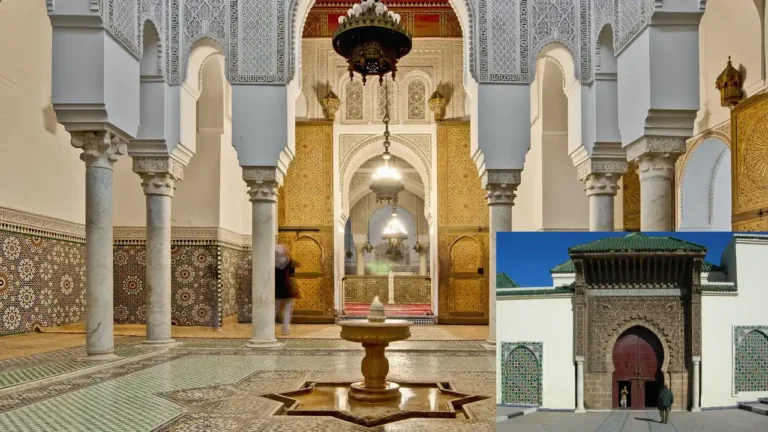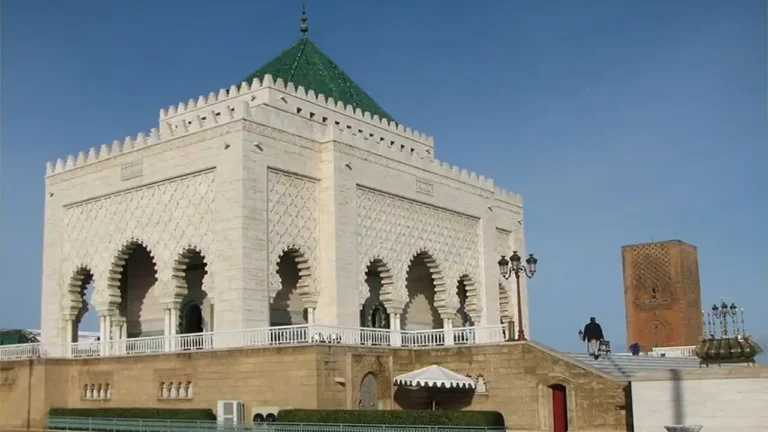Top 10 Authentic Meknes Souks You Must Visit
The souks of Meknes are a vibrant gateway into the city’s rich culture, history, and daily life. Nestled in the heart of this imperial city, these bustling marketplaces offer more than just goods—they are living archives of Moroccan tradition. Each souk reflects centuries-old craftsmanship, dynamic trading practices, and the deep community connections that Meknes is known for. From the aromatic spices and handmade textiles to the artistry of carved wood and intricate metalwork, every corner of these markets tells a story.
What sets the souks of Meknes apart from other Moroccan cities is their unique blend of intimate charm and authentic vibrancy. Unlike the larger and often overwhelming souks of Marrakech or Fes, Meknes offers an immersive yet approachable experience where visitors can connect with local artisans and savor the unhurried pace of a traditional Moroccan market. Whether you’re hunting for exquisite leather goods, sampling regional olive varieties, or marveling at the craftsmanship of traditional pottery, Meknes’ souks promise unforgettable discoveries.
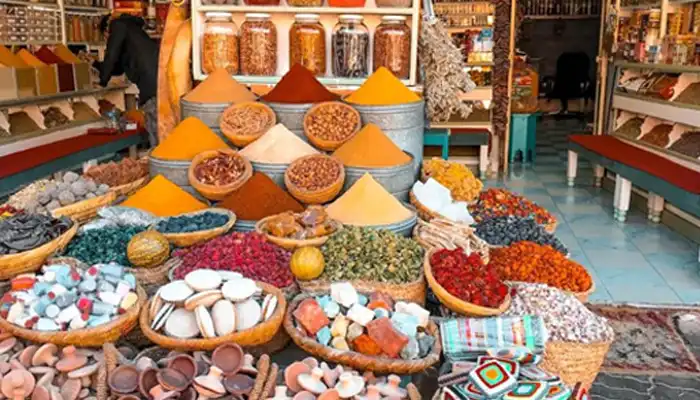
In this guide, we’ll explore the top 10 traditional souks in Meknes, each with its distinct atmosphere and offerings. From the iconic Souk Lahdim to hidden treasures like Souk El Heri, this list will help you navigate the best of Meknes’ marketplace culture while uncovering the artistry and soul of Morocco.
Table of Contents
1. Souk Lahdim
A Hub of Local Flavor and Vibrancy
Souk Lahdim stands as the beating heart of Meknes, where the city’s vibrant energy comes alive. This iconic market is renowned for its colorful displays of fresh produce, aromatic spices, and regional olives that have become a hallmark of Meknes. The rhythmic hum of vendors calling out their offerings and the intermingling scents of saffron, cumin, and preserved lemons create a sensory experience unlike any other.
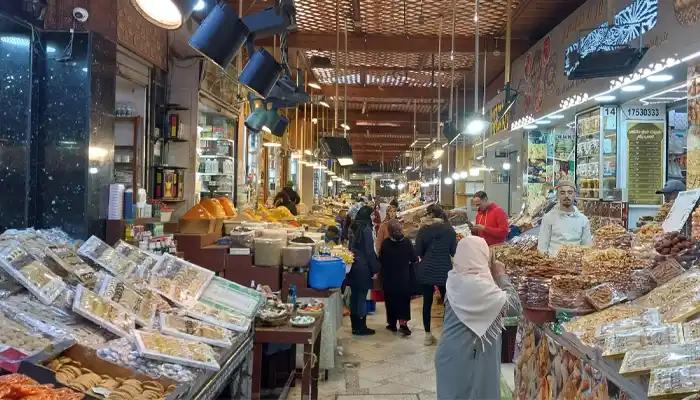
What to Explore
Souk Lahdim is a paradise for culinary enthusiasts. Stalls brimming with freshly picked fruits and vegetables are perfect for sampling local flavors. The spice vendors, with their vibrant mounds of paprika, turmeric, and Ras El Hanout, are an excellent stop for visitors looking to bring home the essence of Moroccan cuisine. Olive lovers will find a treasure trove of varieties, from rich black olives to tangy green ones, all prepared using traditional methods unique to Meknes.
Pro Tip
The best time to visit Souk Lahdim is during market days when farmers from nearby villages gather to sell their goods. Arrive early to experience the market at its most dynamic and secure the freshest products.
2. Souk Sekkakine
A Showcase of Metalworking Artistry
Known as the metalworkers’ haven, Souk Sekkakine offers a fascinating glimpse into the craftsmanship that defines Meknes. This bustling market specializes in traditional Moroccan metal goods, including intricately engraved teapots, knives, and tin items that blend utility with artistic flair.
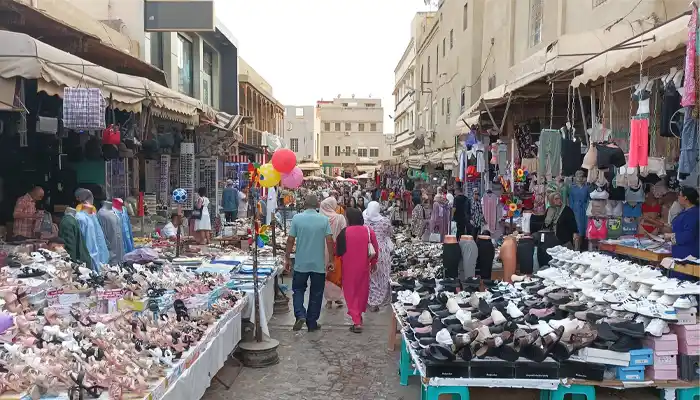
What to Explore
Visitors will be captivated by the variety of handmade metalwork on display. Teapots with delicate engravings, brass trays adorned with geometric patterns, and sharp, beautifully crafted knives are just a few highlights. Many workshops are situated nearby, allowing visitors to see artisans in action as they hammer and etch each piece with precision.
Pro Tip
For a unique souvenir, seek out vendors offering custom engravings on teapots or trays. These personalized items make for memorable keepsakes and gifts.
3. Souk Bezzazine
A Woven Wonderland of Handcrafted Goods
Souk Bezzazine is Meknes’ go-to destination for those seeking eco-friendly and beautifully crafted wicker goods. This charming market is dedicated to traditional basketry, offering a wide range of handwoven items that blend functionality with timeless artistry.
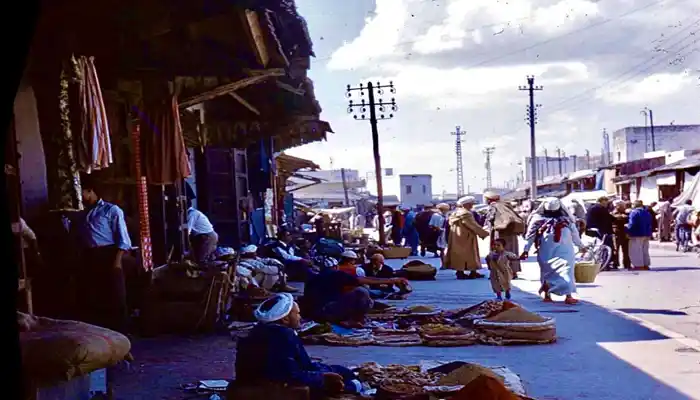
What to Explore
The souk is filled with a variety of baskets, trays, and decorative pieces, all handmade by skilled artisans using natural materials. These items are ideal for home decor or as thoughtful gifts. Visitors can also discover unique woven accessories, such as straw bags and hats, that showcase the creativity and skill of the local craftspeople.
Pro Tip
Engage with the artisans to learn about the techniques passed down through generations. Their stories add depth to the shopping experience and connect you to the cultural heritage of Meknes.
4. Souk Nejjarine
The Mastery of Moroccan Woodworking
Souk Nejjarine is a treasure trove for lovers of finely crafted wooden goods. This market specializes in traditional Moroccan carpentry, where the artistry of local woodworkers takes center stage. Each item is a testament to the region’s rich woodworking heritage.
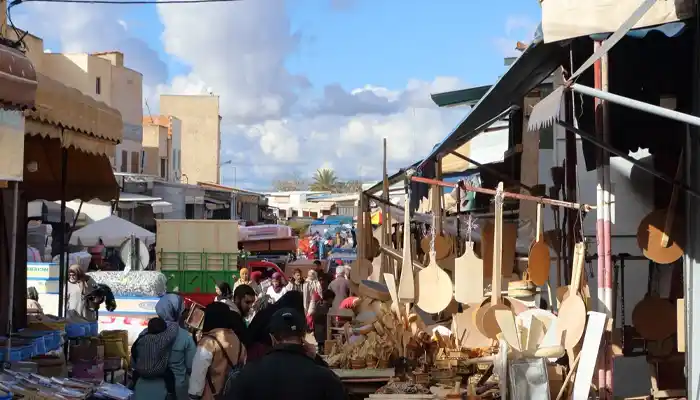
What to Explore
From intricately carved furniture to smaller wooden items like jewelry boxes and decorative plaques, Souk Nejjarine offers a diverse selection of handcrafted goods. Visitors can find unique home decor pieces, such as ornamental mirrors and elaborately designed chairs, which highlight the exquisite craftsmanship for which Meknes is renowned.
Pro Tip
Visit earlier in the day to observe the artisans at work. Watching their meticulous attention to detail and skillful use of tools enhances your appreciation of these one-of-a-kind creations.
5. Souk Sebbat
A Colorful Haven for Textiles and Footwear
Souk Sebbat is a lively marketplace in Meknes that brims with vibrant fabrics, traditional Moroccan attire, and handmade footwear. Known for its abundance of colorful textiles and leather goods, this souk offers visitors a glimpse into Morocco’s rich fashion heritage.
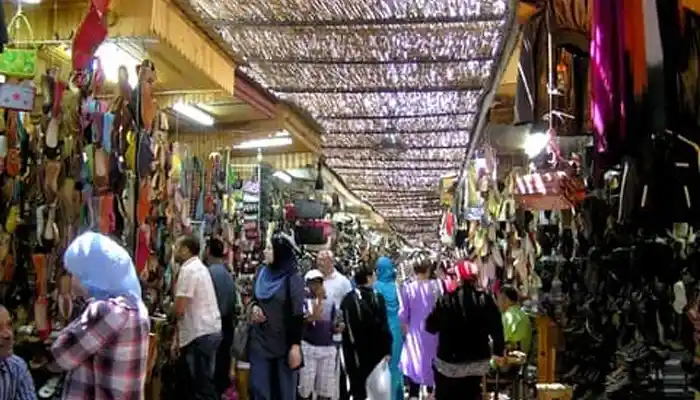
What to Explore
Visitors to Souk Sebbat will find stalls showcasing handmade leather shoes, embroidered slippers (known as babouches), and a wide array of traditional garments, including kaftans and djellabas. The market is also an excellent place to browse for premium fabrics, from soft cottons to intricately patterned textiles that reflect the artistry of Moroccan design.
Pro Tip
Take your time exploring the stalls to find high-quality leather goods. Vendors are often open to bargaining, so engage with a friendly attitude to secure the best price.
6. Souk El Herir
The Luxury of Moroccan Silk
For lovers of fine fabrics, Souk El Herir is a must-visit destination. Specializing in silk products, this market offers a luxurious selection of textiles that are perfect for clothing, home decor, or souvenirs. Its name, derived from the Arabic word for silk (herir), reflects its historic association with this prized material.
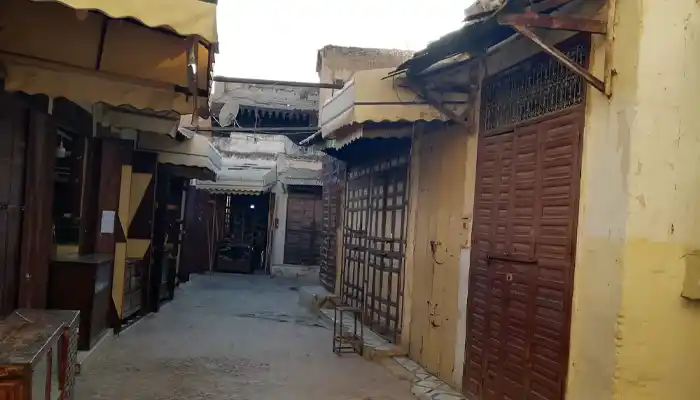
What to Explore
The stalls of Souk El Herir feature soft, shimmering silks in a range of vibrant colors and patterns. Visitors can find beautiful scarves, flowing dresses, and upholstery fabrics that add a touch of elegance to any setting. Many of the products here are crafted using traditional weaving techniques that have been preserved through generations.
Pro Tip
Ask vendors about the origins of the silk and its crafting process to gain insight into the intricate artistry behind each piece. This knowledge adds value to your purchase.
7. Bab el-Jdid Souk
A Treasure Trove of Vintage Finds and Musical Instruments
Bab el-Jdid Souk stands out for its eclectic offerings, ranging from vintage goods to traditional Moroccan musical instruments. This market, located near the historic Bab el-Jdid gate, is a fascinating blend of old and new, making it an exciting spot for curious visitors.
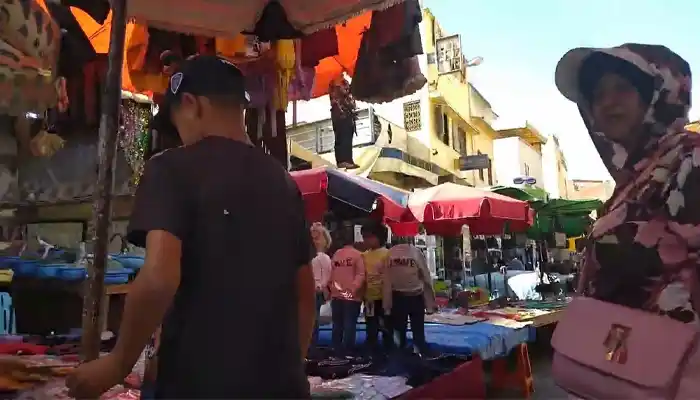
What to Explore
Shoppers can browse through second-hand treasures, including vintage home goods, decorative items, and everyday essentials. For those interested in Moroccan music, the souk also features stalls selling traditional instruments such as ouds, drums, and cymbals, offering a chance to connect with the country’s musical heritage.
Pro Tip
Arrive early to uncover rare finds before the market becomes busy. Vendors are often happy to share stories about the items they sell, adding a personal touch to your shopping experience.
Souk El Had
Specialty: A vibrant weekly market offering a diverse range of goods, from fresh produce to artisanal crafts.
What to Explore: Immerse yourself in the lively atmosphere where local farmers and artisans showcase their products. Discover seasonal fruits, vegetables, handcrafted pottery, textiles, and unique souvenirs that reflect the rich cultural heritage of Meknes.
Pro Tip: Arrive early to experience the market at its peak activity and to have the best selection of goods. Engaging with vendors can provide deeper insights into the local culture and traditions.
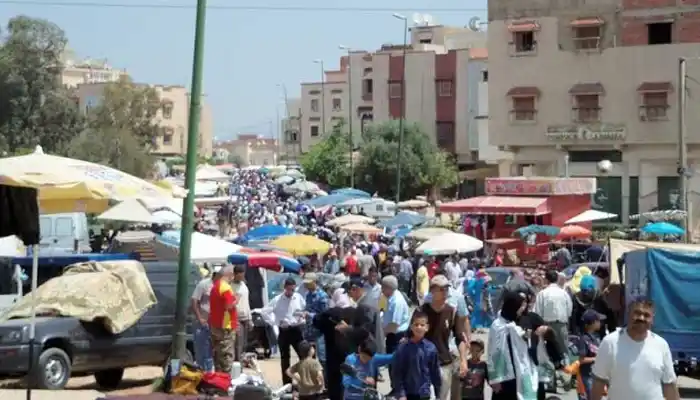
Souk Atriya
Specialty: A gastronomic haven renowned for its diverse array of culinary delights.
What to Explore: Delve into a sensory feast with stalls showcasing meticulously arranged pyramids of prunes, olives, spices, nuts, dates, and an assortment of sugary pastries in every conceivable shape and color. Meknes is famed for its olives, and the variety on display, along with the painstaking care in presentation, is nearly as geometrically enthralling as the decorative designs on the Bab Mansour.
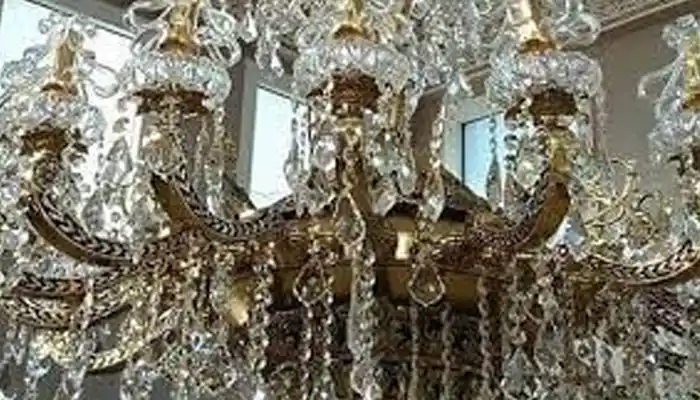
Pro Tip: Visit during the morning hours to experience the market at its most vibrant. Engage with vendors to learn about traditional Moroccan culinary practices and perhaps sample some local delicacies.
10. Souk El Khemis
The lively Souk El Khemis, held weekly on Thursdays, is a vibrant marketplace that offers a unique blend of fresh produce, local delicacies, and household goods. This bustling market draws traders and shoppers from across the region, creating an authentic Moroccan shopping experience.
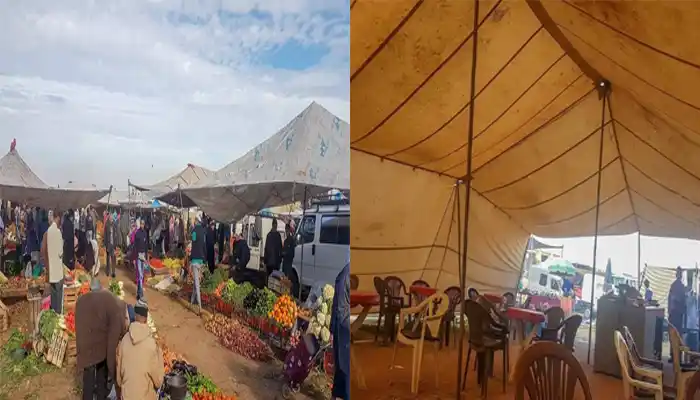
What to Explore
- Seasonal Fresh Produce: Souk El Khemis is renowned for its colorful displays of fruits and vegetables, often sourced directly from nearby farms.
- Artisanal Goods and Daily Essentials: Browse stalls filled with everything from handmade utensils to practical household items, showcasing the diversity of local craftsmanship.
- Unique Finds: Amid the regular wares, visitors can discover unexpected treasures, including second-hand goods, vintage items, and regional delicacies.
Pro Tip
Arrive early to beat the crowds and explore the market at its liveliest. Early mornings also offer the best selection of goods, especially when looking for high-quality produce or rare finds.
Tips for Visiting Meknes’ Souks
The vibrant souks of Meknes are an unforgettable experience, but navigating them can be overwhelming for first-time visitors. Here’s how to make the most of your visit:
Best Times to Visit
- Early Mornings: Experience the souks when they’re quieter and cooler, ideal for browsing at a leisurely pace.
- Late Afternoons: Enjoy a more relaxed atmosphere as vendors wind down for the day.
Navigation Tips
- Use landmarks like gates and mosques to stay oriented in the maze-like alleys. Offline maps can be helpful, but part of the charm is wandering and discovering hidden gems.
Bargaining Advice
- Approach negotiations with respect and a sense of humor.
- Start at about half the vendor’s asking price and work towards a fair deal.
- Take your time, as bargaining is as much about the interaction as it is about the price.
What to Buy in Meknes Souks
The souks of Meknes are a treasure trove of authentic Moroccan goods, offering something for every taste and interest. Shopping here isn’t just about souvenirs; it’s about connecting with the city’s artisanal heritage.
Top Souvenirs
- Leather Goods: Handmade bags, belts, and shoes crafted using traditional techniques.
- Spices: Vibrant saffron, cumin, paprika, and other aromatic blends that are staples in Moroccan cuisine.
- Silk Fabrics and Textiles: Luxurious silk garments and handwoven blankets ideal for home decor or gifts.
- Ceramics: Beautifully painted pottery featuring traditional Moroccan designs.
- Wooden Crafts: Intricately carved furniture and decor pieces from Souk Nejjarine.
Unique Finds
- Olive Products: Meknes is known for its high-quality olives and olive oil, a must-buy for culinary enthusiasts.
- Brass Lanterns and Teapots: Exquisite metalwork items available in Souk Sekkakine.
- Wicker Baskets: Eco-friendly, handcrafted baskets from Souk Bezzazine, perfect for storage or decoration.
Packing Tips
- Wrap fragile items, like ceramics and lanterns, in soft clothing or bubble wrap to protect them during transit.
- For bulkier goods, such as rugs or wooden items, consider shipping options to avoid excess baggage fees.
The souks of Meknes are more than markets—they are living stories of craftsmanship, culture, and community. Each souk offers a distinct experience, from the vibrant energy of Souk Lahdim to the artisan treasures of Souk Nejjarine. Whether you’re hunting for spices, handcrafted leather goods, or unique souvenirs, these bustling marketplaces invite you to immerse yourself in the heart of Moroccan life. A stroll through Meknes’ souks isn’t just shopping—it’s a journey into tradition, where every corner holds a piece of the city’s soul.
